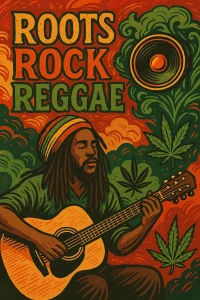What Is Reggae Music? Understanding the Sound and Spirit

Reggae music is more than just a genre — it’s a global movement of cultural identity, resistance, and peace. Originating in Jamaica in the late 1960s, reggae has grown to influence music worldwide. The phrase “Roots, Rock, Reggae”, popularized by Bob Marley, encapsulates the deep cultural roots, the energetic rhythm, and the powerful messages behind this iconic genre.
Roots Reggae: African Heritage and Cultural Identity
Roots reggae traces its lineage through earlier Jamaican music styles like ska and rocksteady, but its deeper roots lie in African traditions. Reggae music incorporates call-and-response vocals, spiritual themes, and rhythmic drumming patterns reminiscent of African culture.
Much of reggae’s lyrical and spiritual foundation is influenced by the Rastafari movement, which emphasizes black empowerment, repatriation to Africa, and resistance to systemic oppression—often referred to as “Babylon.” This connection gave reggae a dual purpose: entertainment and a voice for social consciousness.
The Rhythm of Reggae: Rocksteady Influence and Musical Innovation
Musically, reggae took the groove of rocksteady and slowed it down, placing emphasis on the “one drop” rhythm — a unique drum pattern that hits hardest on the third beat of each measure. Combined with deep, melodic basslines and the iconic upstroke guitar skanks, reggae music developed a hypnotic and uplifting feel.
This rhythmic backbone made reggae highly danceable, while also allowing space for messages of protest, love, and spirituality to resonate deeply with audiences across cultures.
Jamaican Music as a Tool for Social Change
During the 1970s, artists like Bob Marley, Peter Tosh, Burning Spear, and Jimmy Cliff brought reggae to a global stage. Their lyrics tackled pressing social issues, including poverty, racial injustice, and political corruption. Songs such as “Get Up, Stand Up” and “Equal Rights” became global protest anthems.
At the same time, reggae conveyed a message of unity and peace. Tracks like “One Love” and “Redemption Song” called for global harmony, understanding, and forgiveness — offering comfort in troubled times.
The Global Legacy of Reggae Music
Reggae has had a profound influence on other genres, including hip-hop, reggaeton, and Afrobeat. Its rhythms, themes, and spiritual undertones have transcended borders, making it a truly global genre.
In 2018, UNESCO added reggae to its list of Intangible Cultural Heritage of Humanity, recognizing its contribution to international discussions on justice, identity, and peace.
Final Thoughts
“Roots, Rock, Reggae” isn’t just a catchy phrase — it represents a powerful tradition of resistance, identity, and unity. From Kingston to Nairobi, London to Lagos, reggae continues to inspire generations with its unshakable message of peace and liberation.
Whether you’re discovering reggae for the first time or are a lifelong fan, the genre’s enduring influence proves that music can indeed be a force for global change.